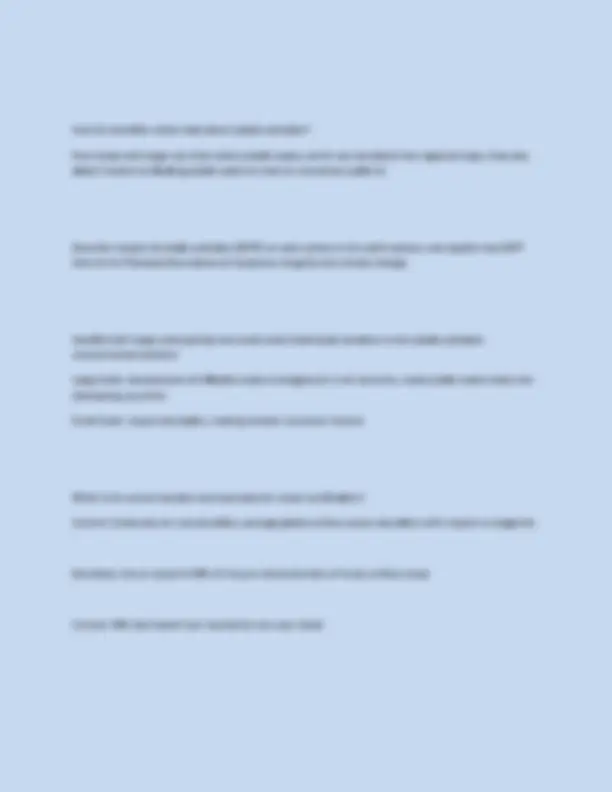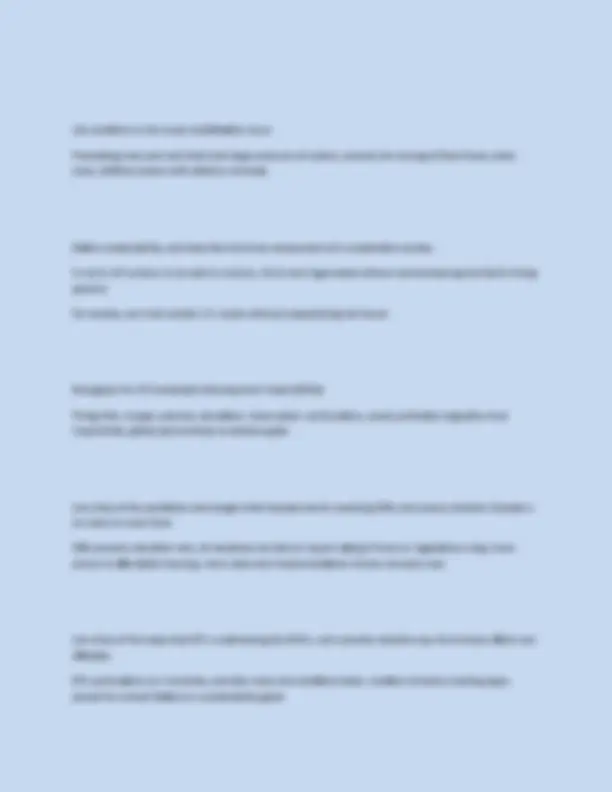








Study with the several resources on Docsity

Earn points by helping other students or get them with a premium plan


Prepare for your exams
Study with the several resources on Docsity

Earn points to download
Earn points by helping other students or get them with a premium plan
Community
Ask the community for help and clear up your study doubts
Discover the best universities in your country according to Docsity users
Free resources
Download our free guides on studying techniques, anxiety management strategies, and thesis advice from Docsity tutors
EVSC FINAL EXAM 4122 COASTAL ECOLOGY SEMINAR QUESTIONS WITH VERIFIED ANSWERS 2025-2026 ACCURATELY 100%
Typology: Exams
1 / 12

This page cannot be seen from the preview
Don't miss anything!







What is the control variable for atmospheric aerosol loading?
Aerosol optical depth (AOD)
Why can we not yet quantify the planetary boundary for atmospheric aerosol loading?
Due to the complexity and diversity of different aerosols.
What are atmospheric aerosols?
They are tiny particles that float in the atmosphere.
What are the natural and anthropogenic sources of aerosols?
Natural: sea salt, volcanic dust, desert dust, smoke from fires (accounts for about 90% of aerosols)
Anthropogenic: Burning of oil, fossil fuels
how are aerosols detected and measured?
NASA measures through satellites and radiometers, they show the global distributions. They are measured in terms of optical thickness. less than 0.05 is a clear sky, 1 is hazy, more than 2/3 is no visibility.
What are the direct and indirect effects of aerosols on the climate and the hydrolic system?
Effects on the water cycle: more clouds form, aerosols provide the clouds a nucleus, more radiation reflects
Climate: if conditions persist it changes the climate by cooling due to more clouds and less radiation hitting earth
Whats an example of how atmospheric aerosols and biogeochemical cycles are connected?
How do atmospheric aerosols effect human health?
causes lung diseises, cancer and overall breathing issues. Results in almost a million deaths.
Why should aerosols be monitored?
Because they have influence over climate change, human health and unique growth patterns (Amazon forest)
What are the control variables and planetary boundaries for biosphere integrity?
Controls: genetic diversity-extinction rate
Functional diversity- biological intactness index (BII)
Define different trophic levels in the food web:
Primary producers (autotrophs), secondary producers (Herbivores), tertiary producers (carnivores), Quaternary producers (top carnivores, apex predators).
Define the terms: ecosystem, community
ecosystems are a part of biomes that consist of living and non living components.
communities are a part of ecosystems that consist of the living and interacting species.
Define: Keystone species, niche and habitat
keystone species are a species that have a large impact versus their small abundance.
habitat: physical space that species lives
niche: how the species functions, its roles
Explain how a 'mass extinction' is defined, and evaluate evidence that suggests that human activities are leading to a 6th mass extinction:
definition: a loss of about three quarters of all species in existence across the entire Earth over a "short" geological period of time
Evidence: rates compared to historical extinctions are much higher, would take millions of years to reverse current damage
What are the Strategic Goals of the Aichi Biodiversity targets, and reflect on whether the first target has been achieved?
Goals: address underlying causes by mainstreaming, reduce direct pressures, improve status of biodiversity, enhance benefits, enhance implementation.
What is the distribution of land use?
29% is land, 71% is ocean.
Habitable land: 50% agriculture, 37% forests, 11% suburbs
What are the main causes of land use change?
Deforestation for agricultural use
What are the control variables and planetary boundaries for land system change?
Control: Global-area of forested land as a % of orgional forest cover
Biome- area of forested land as a % of potential forest
Boundary: Global- 75%
Biome- tropical 85%, temperate 50%, boreal 85%
Current: Global-62%
It can fail and it not always appropriate because post deforestation or due to the ecosystem there isn't enough water to support mass tree planting. Many of the trees planted require more water than the previous grasslands needed.
Define a novel entity according to the planetary boundary framework.
new substances and modified life forms that have potential for unwanted biological and geophysical effects.
Identify the 3 criteria for a pollutant to be considered a planetary boundary for novel entities.
Whats one reason there isnt a set of planetary boundaries for novel entities?
Enough of the chemicals haven't been tested to know if they are harmful, it is a newer type of harm that needs more research
So many novel entities its hard to quantify
Provide evidence for how plastic meets the three criteria for being a planetary boundary:
They are extremely durable and don't degrade easily, making their effects very hard to reverse.
Plastic waste is harmful to animals which effects biodiversity (an earth systm)
Plastic waste devalues freshwater quality and can effect water systems
Plastics have been found is nearly all places on Earth (global scale)
how do scientists collect data about plastic pollution?
from boats with large nets that collect plastic waste, which are translated into regional maps, they also attach trackers to floating plastic waste to track its movement patterns
Describe impacts of plastic pollution (MPP) on each sphere in the earth system, and explain how MPP links to the Planetary Boundaries of biosphere integrity and climate change
Identify both large-scale (policy) and small-scale (individual) solutions to the plastic pollution environmental problem
Large Scale: development of effective waste management in all countries, cease plastic waste trade into developing countries
Small Scale: recycle all plastics, making smarter consumer choices
What is the control variable and boundary for ocean acidifcation?
Control: Carbonate ion concentration, average global surface ocean saturation with respect to aragonite
Boundary: less or equal to 80% of the pre-industrial state of mean surface ocean
Current: 84% (we haven't yet crossed but are very close)
List solutions to the ocean acidification issue.
Protecting trees and soils that hold large amounts of carbon, protest the mining of fossil fuels, plant trees, fertilize oceans with alkaline minerals,
Define sustainability, and describe the three components of a sustainable society.
In terms of humans, to be able to endure, thrive and regenerate without overburdening the Earths living systems
For society, one that sustains it's needs without jeopardizing the future
Recognize the 17 Sustainable Development Goals (SDGs)
Things like, hunger, poverty, education, clean water, social justice, ocean protection arguably most importantly, global partnerships to achieve goals
List a few of the ambitions and targets that Canada has for reaching SDGs and assess whether Canada is on track to meet them
50% poverty reduction rate, all canadians be able to report eating 5 fruits or vegetables a day, more access to affordable housing, more sales and implementations of zero emission cars
List a few of the ways that SFU is addressing the SDG's, and consider whether you think these efforts are effective
SFU publications on inclusivity, provides clean and sanitized water, creation of waste tracking apps, joined the United Nations in sustainability goals
List the 5 transformational policies that Rockstrom says are needed for us to reach the SDGs within the Planetary Boundaries
Give an example of a nature-based solution to climate change.
Using Indigenous peoples knowledge and voices. Protecting forests and afforestation.
Explain why the concept of "waste" is unique to human systems.
The law of conservation matter states that matter is neither created or destroyed. In nature all materials are recycled, but this is not the same in human societies. Things are thrown away
Explain the concept of an ecological footprint.
The impact an individual or country has on the environment, expressed as the amount of land required to support their use of natural materials.
Describe choices individuals can make to minimize their ecological footprint, and explain which planetary boundaries they address.